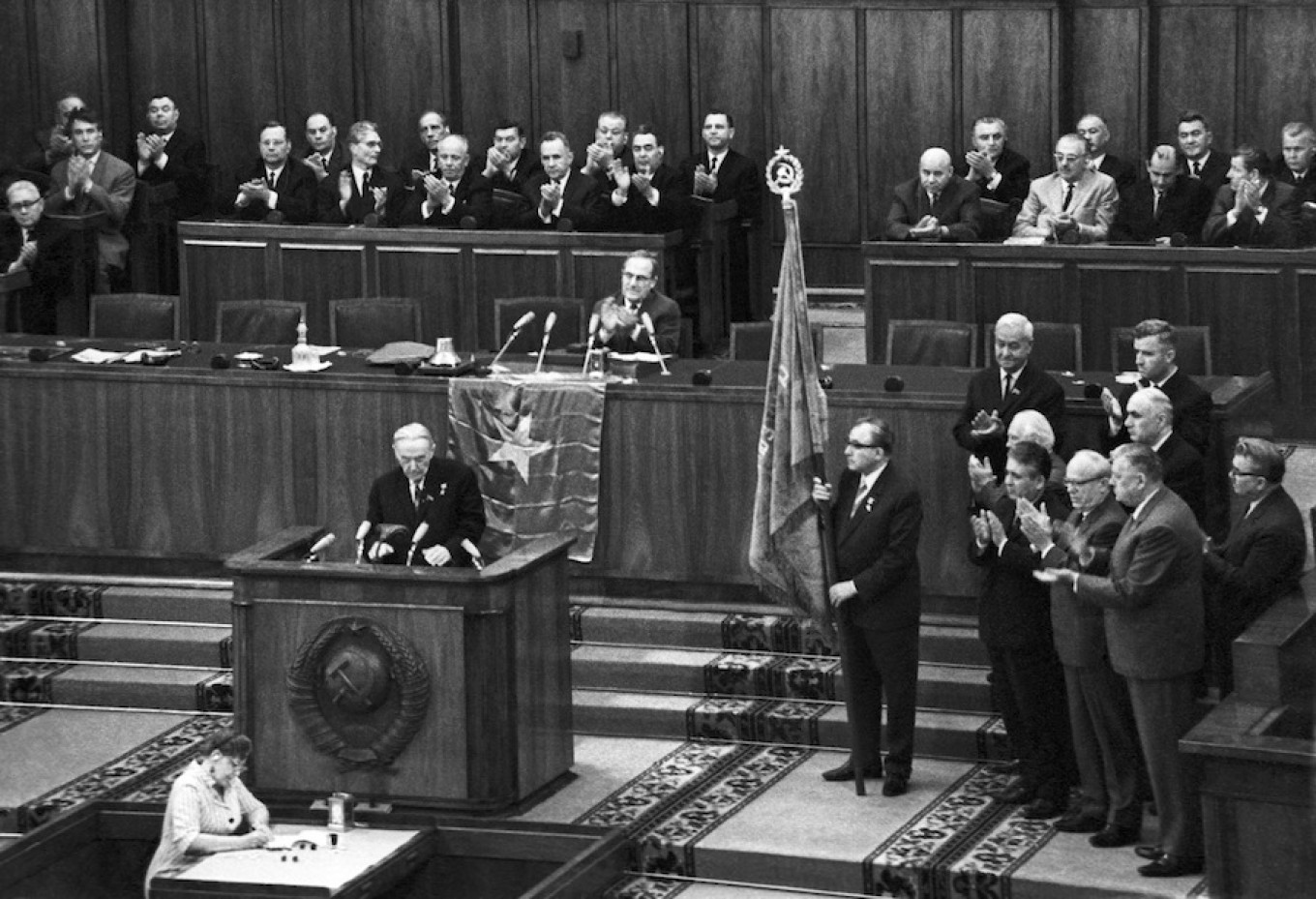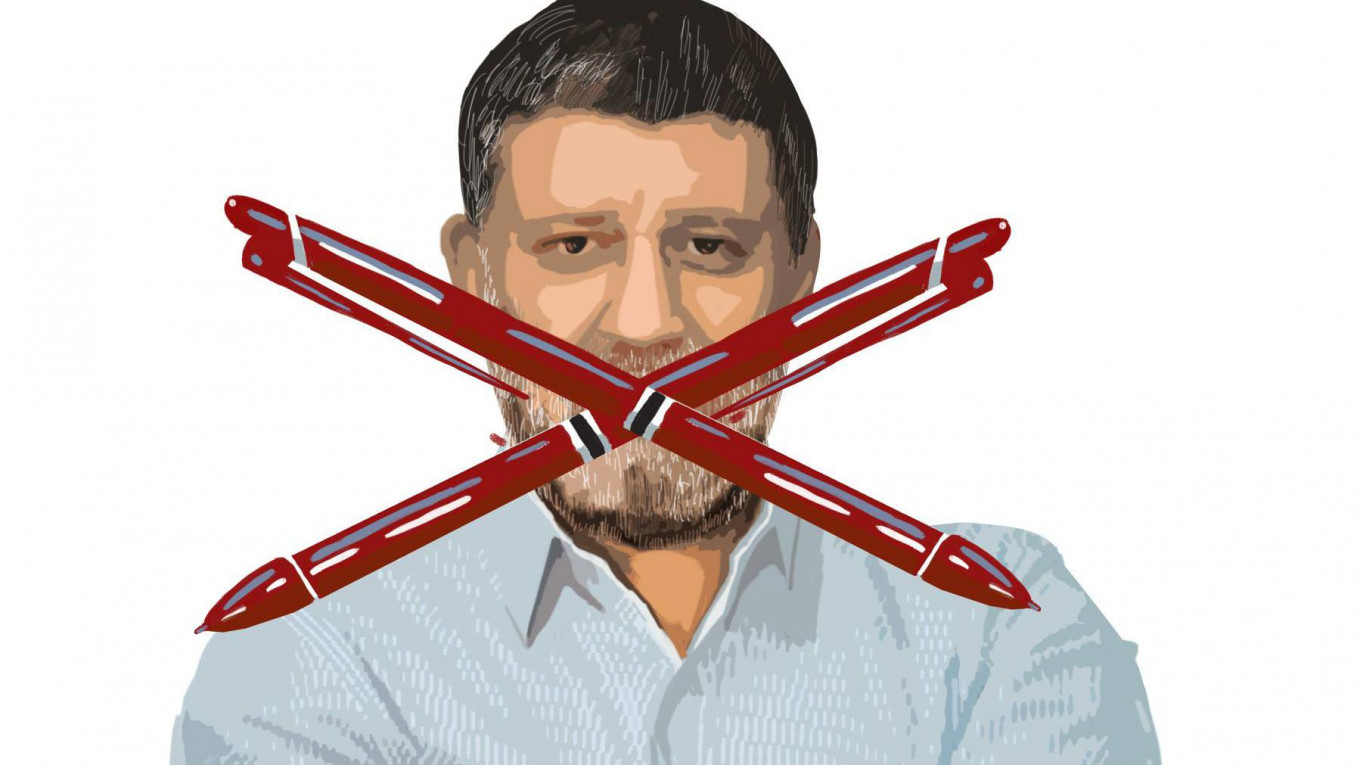“A person whom we thought was an aesthete has turned out to be one of the sharpest exponents of a distinctly political battle.”
In 1958, that description of Boris Pasternak by the literary scholar Kornely Zelinsky at a writers’ gathering was deliberately damning. Several days earlier, Pasternak had been expelled from the Soviet Writers’ Union for his “anti-Soviet” views. The public pummeling by his colleagues was the final nail in the coffin.
Since then, Pasternak and many other writers who fell foul of the Soviet authorities, have been rehabilitated, signaling the country’s new commitment to free speech and openness.
But fears that some of those gains are being reversed have sounded once more in Moscow in recent weeks after a prominent journalist was expelled from the Russian branch of the Poets, Essayists and Novelists association, or PEN. Two other members have also received strict warnings for their political activities in a move that is unprecedented in the center’s almost 30-year history.
Split
Those looking for Soviet-era undertones in the expulsion, do not have to look too far.
“It appears that Sergei Parkhomenko, who has the reputation of a ‘Bolotnaya Square provocateur,’ joined our organization only to destroy it from within by turning it into an opposition political party,” PEN’s board announced in an online statement in late December.
Parkhomenko, a blogger and radio commentator, did indeed play an active role in mass anti-Kremlin protests in 2011 and 2012. He is also involved in the Dissernet group which exposes plagiarism, often targeting Kremlin-affiliated officials, and the Last Address project to commemorate the victims of Soviet repression.
But whereas in Pasternak’s time the accusation of anti-government activity was enough to make him a pariah, Parkhomenko’s expulsion has caused a wave of outrage in Russia’s literary community, splitting it into opposing sides.
Almost two dozen writers, including some of Russia’s biggest names such as Nobel Prize Winner Svetlana Alexievich and detective writer Boris Akunin, have quit the group in protest. Some 55 more members have called for Parkhomenko’s reinstatement in an online letter which also questions the legitimacy of PEN’s leadership.
“PEN has taken up a kind of neutral, undefined but overall conformist position that I find unacceptable,” Lev Rubinstein, who is among the authors to quit the group, told The Moscow Times. “I’d been delaying the decision, but after Parkhomenko’s expulsion I realized I can’t stay there anymore.”
Others have been even less forgiving. “Russian writers have not been this subservient since Stalinist times. Putin will go, but this shameful page in PEN’s history will remain,” Alexievich said on an unofficial Facebook page of PEN members.

‘Unacceptable Position’
At the heart of the conflict is a disagreement over whether the Russian version of PEN, an international association of writers who are committed to defending freedom of speech, is a political organization.
The question goes back a long way. In 1956, culture officials rejected a request by the Soviet Writers’ Union to join the PEN group, arguing in a letter that it would put Soviet writers in an “unacceptable position: speak out against censorship, or criticize the government and so forth.”
Such concerns took a backseat with the advent of perestroika and glasnost, and in 1989, Russia finally launched its own PEN Center. On occasions, it was critical of the authorities, speaking out against the second Chechen War, for example.
But in recent years and especially since Russia became embroiled in conflict in Ukraine, PEN Russia’s management has steered clear of sensitive topics. “It’s become increasingly geriatric,” Lyudmila Ulitskaya, a former PEN vice-president and writer, told The Moscow Times.
In an attempt to revive the club's political spirit in 2014, she invited roughly forty new “young, talented and socially active” members to join PEN, among whom was Parkhomenko, she said.
Under their influence, a significant segment of PEN’s 400 members became increasingly politically engaged, publishing open letters against the jailing of Ukrainian pilot Nadiya Savchenko, the so-called foreign agents law against NGOs or, more recently, the prosecution of the director of a Ukrainian library for extremism.
While they identify themselves as PEN members, the petitions are signed in their own names, and are often joint initiatives with other rights groups, Parkhomenko told The Moscow Times. Nonetheless, PEN’s management has not been pleased with the change in tone.
In the summer of 2014, Ulitskaya was accused of staging a “takeover” and “politicizing PEN” by its then-head Andrei Bitov himself, ironically, a writer with the reputation of being non-conformist.
“Some of those very people who suffered from Soviet authoritarianism are now copying that very behavior,” says Nikolai Podosokorsky, a prominent literary critic and a PEN member. He doesn’t discount that practical concerns could be involved. “Maybe the management got spooked and thought the center itself could be labeled a foreign agent.”
Ulitskaya quit the group and roughly two dozen people followed, including the prominent writer Lev Timofeyev.
The final drop appears to have been an open letter to Putin signed by dozens of PEN members, including Parkhomenko, asking him to pardon Oleg Sentsov, a Ukrainian filmmaker who opposed the annexation of Crimea and was sentenced to 20 years in prison for “terrorism.”
PEN’s management distanced itself from the appeal as having come from “a group of ‘liberal’ opposition activists, who are trying to come into conflict with us and are following their own line.”
In response, Parkhomenko slammed PEN’s leadership on his Facebook page, which has almost 150,000 followers. “I said it was an embarrassment and a betrayal of the principles PEN Russia was founded on,” Parkhomenko told The Moscow Times. Weeks later he was expelled.
No Revolution
As a young author, PEN Russia’s president Yevgeny Popov himself was ousted from the Soviet Writers’ Union and his work banned. But he doesn’t see any conflict between his personal experience and his own actions.
“PEN is an apolitical rights organization,” he said. “We defend all victims regardless of their political views. But we’re constantly being dragged into a political battle of countries and clans.”
“We don’t want a revolution, there’s been enough of that in Russia, we want evolution,” he added.
Nevertheless, the conflict risks endangering the symbolic step made by Russia after the fall of the Soviet Union, when it was allowed into the PEN club. PEN International, which could revoke Russia’s membership, has so far remained silent. But the signs spell trouble; in an online statement following Parkhomenko's expulsion, the American PEN branch expressed "concern."
In comments to The Moscow Times, its director, Suzanne Nossel, called the complaints by PEN members against their board “serious.” “Their acts of protest reflect both courage and commitment to the core principles that we at PEN America share,” she said.
Should PEN Russia be dismantled, Parkhomenko is convinced a different group will arise in its place. “There is a need for politically active writers,” he says. But he hopes it won’t come to that. “All I expect is from PEN is for it to promote people’s rights. If it is going to do that job, I’ll try to do my part, too.”
A Message from The Moscow Times:
Dear readers,
We are facing unprecedented challenges. Russia's Prosecutor General's Office has designated The Moscow Times as an "undesirable" organization, criminalizing our work and putting our staff at risk of prosecution. This follows our earlier unjust labeling as a "foreign agent."
These actions are direct attempts to silence independent journalism in Russia. The authorities claim our work "discredits the decisions of the Russian leadership." We see things differently: we strive to provide accurate, unbiased reporting on Russia.
We, the journalists of The Moscow Times, refuse to be silenced. But to continue our work, we need your help.
Your support, no matter how small, makes a world of difference. If you can, please support us monthly starting from just $2. It's quick to set up, and every contribution makes a significant impact.
By supporting The Moscow Times, you're defending open, independent journalism in the face of repression. Thank you for standing with us.
Remind me later.






